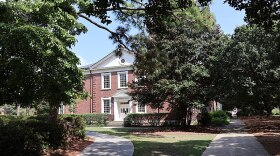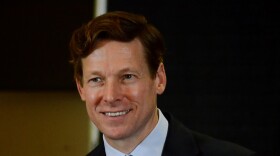Updated Dec. 15 | 3:53 p.m.
On Friday the University of North Carolina Board of Governors heard from a conservative scholar advocating against 'campus illiberalism,' and also voted to approve a controversial free speech policy.
Leaders of North Carolina’s state university system are exploring the possibility of opening a new center at UNC Chapel Hill, with the stated goal of promoting ‘civil discourse’ at the system’s flagship campus. On Friday morning, members of the UNC Board of Governors heard from Robert George, a prominent conservative academic who founded the James Madison Program in American Ideals and Institutions at Princeton University.Among the questions studied by scholars and students at that center, according to its website: “What conditions are necessary to sustain America's experiment in ordered liberty?” and “What is the proper relationship between government and civil society?”
On Friday, George spoke at length about his educational philosophy.
“The way education should proceed is by presenting and engaging with the very best that has been thought and said on competing sides of questions,” he said before the UNC Board of Governors, as well as UNC President Margaret Spellings.
In August, the James Madison Program posted an open letter to college students asking that they ‘think for themselves.’ That letter was signed by 29 faculty members from Harvard, Yale and Princeton universities.
“At many colleges and universities what John Stuart Mill called ‘the tyranny of public opinion’ does more than merely discourage students from dissenting from prevailing views on moral, political, and other types of questions,” the letter reads. “It leads them to suppose that dominant views are so obviously correct that only a bigot or a crank could question them.”
Thinking for yourself, the letter says, requires questioning dominant ideas, “even when others insist on their being treated as unquestionable.”
Spellings, UNC Chapel Hill Chancellor Carol Folt, and several members of the Board of Governors traveled to Princeton this fall to visit the James Madison Program. No formal proposal to open a similar center at UNC Chapel Hill has yet been presented to the board, but George seemed to address the possibility on Friday.
“What you do here will be looked to by other universities,” he said. “I want you to be aware that while your first responsibility is to the people of North Carolina, the importance of what you’re doing goes beyond the borders of the state.”
Some members of the largely-Republican Board of Governors say that establishing a center at UNC Chapel Hill like the one at Princeton would make the state's public universities more welcoming to a diversity of perspectives.
George’s presentation follows votes by the Board of Governors to stop the work of two centers at UNC Chapel Hill, both associated with progressive causes.
George, an outspoken Catholic, is a professor of politics at Princeton and co-author of several books, including "What is Marriage? Man and Woman: A Defense." Earlier this month, he co-wrote an opinion piece defending a Colorado baker who refused to make wedding cakes for same-sex couples.
Free Speech Policy Approved
On Friday afternoon, members of the Board of Governors approved a controversial free speech policy that has some students, faculty and civil liberties watchdogs worried.
The policy requires discipline for students who 'substantially disrupt' others' first amendment rights. Many students and faculty say the policy could be used to silence protesters exercising their right to free speech. But a revision allowing campus administrators flexibility in determining discipline has eased some concerns.
The Board of Governors was directed to create the rules by the state legislature, which is overwhelmingly Republican. The move follows a wave of criticism by conservatives across the country who say college campuses have become hostile to their beliefs.









